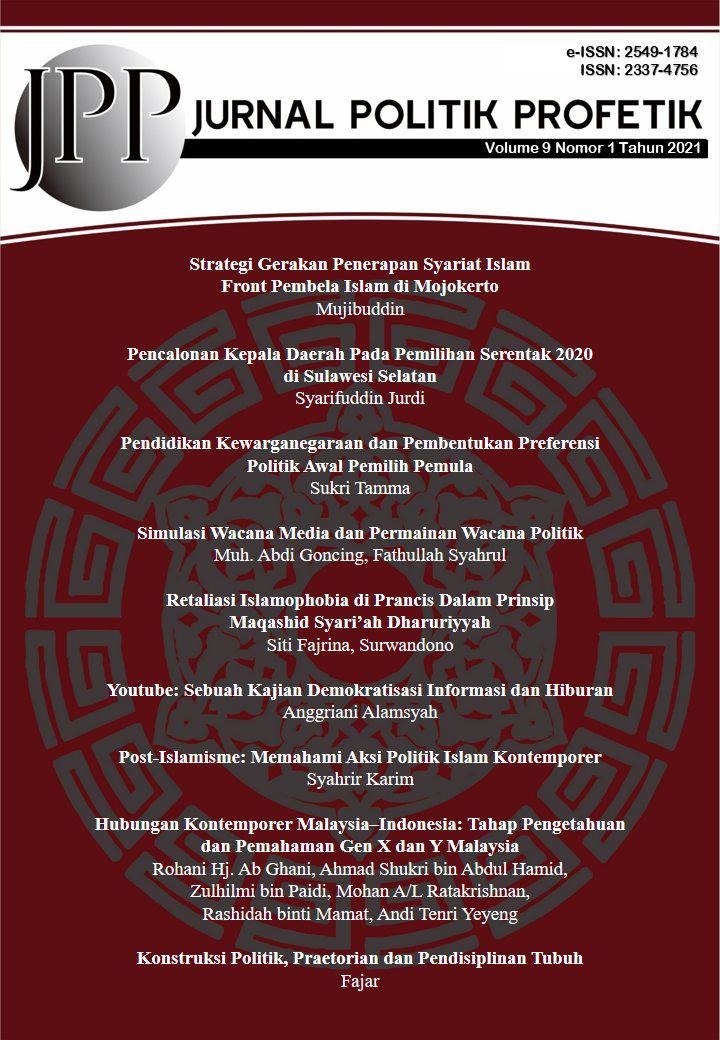POST-ISLAMISME: MEMAHAMI AKSI POLITIK ISLAM KONTEMPORER
Abstract
Post-Islamism is a dynamic Islamic political phenomenon that spreads with various characters. Previously ideologically different groups tried to merge into the same movement and tried to compromise or even fight. Islamic groups or mass organizations that tend to compromise with the state are their way to continue to exist in political reality. Although actually some of them still do not abandon the goals or ideology of the organization totally. This is purely to maintain public sympathy and on the other hand, to exist in the dynamics of state politics. This phenomenon is in line with several main characteristics of post-Islamism, among others, they tend to be pragmatic, tend to compromise with the state without completely abandoning their ideological characteristics, and they tend to be more realistic in seeing the situation. It can be seen that post-Islamism tends to be less in tune with issues of secularism and on the other hand they also reject the application of Sharia law which looks rigid, including ideological-religious platforms in its application in several places. In general, the characteristics of post-Islamism tend to be the same, such as compromise with political realities, pragmatic tendencies in carrying out government programs, and a tolerant attitude towards groups that are considered different with them.
Downloads
References
Azra, Azyumardi. Pergolakan Politik Islam: dari Fundamentalisme, Modernisme, hingga Post-Modernisme. Jakarta: Paramadina, 1996.
Baehr, Peter. “Marxism and Islamism: Intellectual Conformity In Aron’s Time and Our Own” dalam Journal Of Classical Sociology, Vol. 11, No. 2 (2011), h. 173-190.
Bayat, Asef. Pos-Islamisme. Yogyakara, LKIS: 2011.
Choueiri, Youssef M. Islamic Fundamentalism. Boston, Massachusetts: Twayne Publishers, 1990.
Faely, Greg. “Kata Pengantar” dalam Burhanuddin Muhtadi. Dilema PKS: Suara dan Syariah. Jakarta: PKG, 2012.
Hanan, Djayadi. Grakan Pelajar Islam: Di Bawah Bayang-Bayang Negara. Yogyakarta: UII Press, 2006.
Hasan, Noorhaidi. Islam Politik di Dunia Kontemporer: Konsep, Genealogi dan Teori. Yogyakarta: SUKA Press, 2012.
Hilmy, Masdar. Teologi Perlawanan: Islamisme dan Diskursus di Indonesia Pasca Orde Baru. Yogyakarta: Kanisisus, 2009.
Kundnani, Arun. “Islamism and the Roots of Liberal Rage” dalam Race & Class, Vol. 50, No. 2 (2008), h. 40-68.
Maarif, Ahmad Syafii. Islam dan Politik: Teori Belah Bambu Masa Demokrasi Terpimpin (1959-1965). Jakarta: Gema Insani Press, 1996.
Maula, Bani Syarif. “Post-Islamisme dan Gerakan Politik Islam dalam Sistem Demokrasi Di Indonesia” dalam Al-Daulah: Jurnal Hukum dan Perundangan Islam, Vol. 9, No. (2019), h. 90–116.
Internet
Gifariadi, Muhammad Adrian. “Post-Islamisme: Sebuah Pengantar” dalam https://geotimes.id/opini/post-islamisme-sebuah-pengantar/diakses 20 Juni 2021.
Kahar, Novriantoni. “Di Bawah Naungan Islamis” dalam https://regional.kompas.com /read/2011/12/31/02475235/di.bawah.naungan.islamis? diakses 10 Juni 2021.















